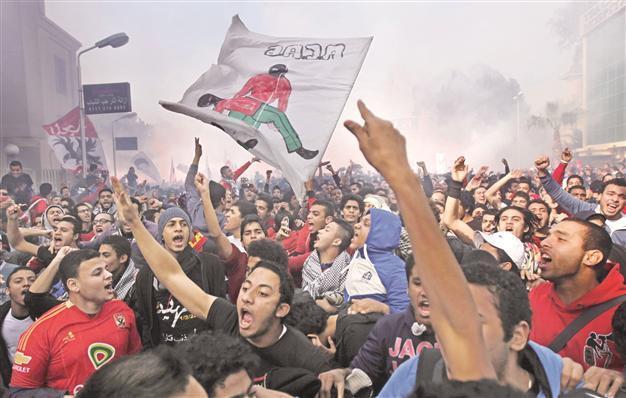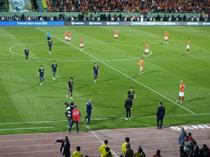Police decision on football spotlights rift with military
James M. Dorsey ISTANBUL - Hürriyet Daily News

Al Ahly fans, also known as ‘Ultras,’ celebrate and shout slogans inside the Cairo-based Egyptian football club’s training stadium after hearing the final verdict of the 2012 Port Said massacre. REUTERS photo
A refusal by Egyptian security forces to police football matches spotlights differences between the interior and defense ministries at a time when President Mohammed Morsi is under mounting pressure to reform the country’s law enforcement institutions, widely despised for their role as the enforcers of the repression of toppled President Hosni Mubarak’s regime and continued violations of human rights.The rejection contrasts with the military’s authorization last month of the restart of the Premier League that had been suspended for a year in the wake of the death of 74 football fans in a politically loaded football brawl. The military endorsed the resumption against the will of the Interior Ministry provided matches were played initially in military stadiums without spectators.
The importance of reform of law enforcement stems from the fact that Mubarak, like most Arab autocrats, ran a police rather than a military state. The Interior Ministry’s police and security forces are, with 1.25 million men, more than twice the size of the military. Widely viewed as corrupt and brutal, they were responsible for domestic spying and surveillance, repression of expressions of discontent and the stealing of elections.
Moreover, the impact of the Interior Ministry’s continued opposition to the reinstitution of football has not only a political but also an economic impact at a time that Egypt’s economy is in decline. A study by Assiut University’s Gamal Mohammed Ali established that some 4 million Egyptians make their living directly or indirectly from football. Ali estimated that the one-year suspension had cost clubs $178 million.
Security request
Crowned Cairo clubs Zamalek and Al-Ahly had requested police security for two upcoming Confederation of African Football (CAF) Championship League matches. Zamalek made its request after securing military’s cost permission to play Gazelle of Chad on Feb. 17 in the Mediterranean port city of Alexandria’s Borg El-Arab Stadium, Africa’s third-largest facility, designed and built by the Egyptian Armed Forces Corps of Engineers (EAFCE), with fans present. Al-Ahly is scheduled to play its next CAF match in March.
Morsi’s failure to initiate the difficult process of reform of Mubarak-era institutions, foremost among which are law enforcement and the judiciary, is at the core of mass protests in the past month that have cost the lives of more than 60 people. The president last month declared emergency rule in Port Said and two other cities, Suez and Ismailia, and ordered the military to enforce law and order after a Cairo court sentenced to death 21 of 73 defendants accused of responsibility for the Port Said brawl.
Morsi was elected as the candidate of the Freedom and Justice Party (FJP) established by the Muslim Brotherhood, whose platform identified reform of the police and security forces as one of its key issues.
The president initially seemed committed to the platform by replacing a number of senior police chiefs and intelligence officials.
Yet, Morsi weakened rather than strengthened his grip on the security sector by endorsing amendments to the police law that removed the president as head of the Supreme Council of the Police and further improved the administration of salaries and pensions in a bid to thwart discontent within the forces. His removal of pro-Mubarak commanders was counterbalanced by his appointment of Gen. Khaled Tharwat as head of the recently established National Security Apparatus (NSA). Tharwat was in charge of the security forces’ domestic spying and surveillance as well as a unit dedicated to countering the Brotherhood under Mubarak.
Need for rehabilitation
To be fair discontent within the security forces reflects a sense within their ranks that police and security forces, despite their brutality, are as much a victim of the Mubarak regime as are others. Sources close to the security forces describe an institution that feels defeated and humiliated by public animosity and repeated verbal and physical attacks much like the Egyptian military defeat after its virtual 1967 destruction in the Six Day War against Israel.
“Many [officers] are in need of psychological rehabilitation. The revolution broke some of them, while others became more brutal and violent. ... Both situations are equally bad,” said former Public Security Maj. Tamer Makki, who is a member of the upper house of Parliament, in an interview with scholar Omar Ashour, who authored a recent report on the Egyptian security sector.
Law enforcement is set to become again a flashpoint on March 9 when the court rules in the case of the remaining 52 accused, who include nine midlevel security officials. The sentencing of the 21, all supporters of Al Masri, sparked the violent protests in part because security officials were not included in the first batch of verdicts. The court’s delay of the sentencing of security officials fueled public anger at the fact that no official has to date been held accountable for the death of more than 800 protesters since the initial mass demonstrations that forced Mubarak to resign after 30 years in office.
The pressure for reform of the police and security forces was further fueled by the leaking of the summary of the prosecutor’s case in the trial that charged that the police were as culpable as Al Masri fans and executives in the lethal Port Said brawl. The leak coincided with a human rights report that concluded that “the Egyptian police continue to systematically deploy violence and torture, and at times even kill.”
Amid political volatility and a growing belief among Egypt’s youth and militant football fan groups, one of the country’s largest civic groupings after the Muslim Brotherhood, that it will take street rather than electoral politics to ensure real post-revolt change, reform of the security sector could emerge as Morsi’s make-or-break litmus test.
















